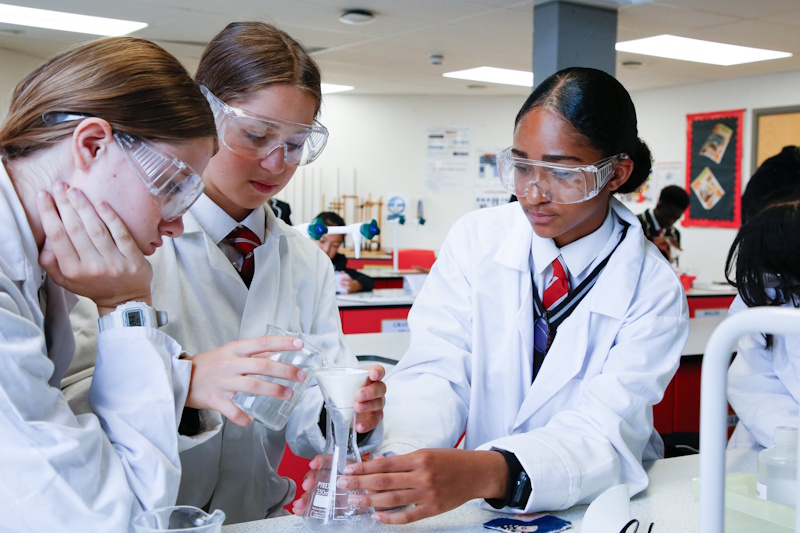Ruby Seger-Bernard outlines how free Royal Society school resources and the Partnership Grants scheme support practical science teaching in UK schools.

A strong science education provides young people with the knowledge and skillset to understand and respond to challenges of the modern world. Through its Schools Engagement programme, the Royal Society aims to support science, technology, engineering and mathematics (STEM) teachers and engage young people with science in school and beyond. It aims to improve access to free science resources for students from different socioeconomic backgrounds, helping them see themselves in STEM careers. Many of the Royal Society schools resources address this, featuring real scientists from diverse disciplines and backgrounds. In line with this, the Royal Society continues to develop and produce a range of resources for teachers and students, alongside its Partnership Grant funding scheme for UK schools and colleges. The resources cover a range of STEM subjects, STEM careers and experiments, and are designed to be accessible, inexpensive and representative of scientists working in the UK today.
The Science Education Tracker (2023) highlights a sharp decline in opportunities for secondary education students in England to participate in hands-on practical science. Coinciding with these concerns are increasing demands for technological skills and scientific research and innovation in the workforce to support economic growth and tackle global challenges such as climate change.
The Tracker, published in collaboration with EngineeringUK, provides a comprehensive survey of young people across England, exploring their attitudes towards science and STEM careers. The Tracker highlights concerns that students are accessing less interactive or hands-on learning in science lessons, and that this decline may be associated with decreased confidence and motivation (SET 2023). It suggests ways in which access to practical science can impact students differently depending on a range of factors, such as age, gender and socio-economic background, finding that “disengagement is more pronounced among students in early secondary education, students eligible for Free School Meals (FSM), and students with Special Educational Needs (SEN)”.
The Brian Cox school experiments are a set of classroom resources which offer insights into STEM careers across research and industry fields for primary and secondary age students. Central to the resources are individual classroom experiments which range across STEM subjects and include demonstrative videos featuring science presenters Professor Brian Cox and Dame Maggie Aderin-Pocock, downloadable guidance notes for teachers and technicians, and printable ready-to-use worksheets for students. Each classroom experiment is paired with two interviews of scientists working in research and industry to showcase the work being done across the UK within the field of science the students are exploring through the experiment. These interviews took place in the scientists' laboratories or places of work across England, Wales and Scotland, and offer students insights into the diverse nature of STEM careers. The resource is free for teachers or parents to download and uses readily available, inexpensive equipment which most schools can access. Topics in the latest set feature titles ‘Can we design a robotic arm?’ and ‘Do sun and shade plants have different rates of photosynthesis?’.
Another resource, Why Science is for me, is an animated video with accompanying posters to download, highlighting the value of studying science for a wide range of careers. The animation and poster features scientists from diverse backgrounds in a variety of STEM roles. For instance, scientific and critical thinking is relevant to a range of careers such as chef, sports coach, zookeeper and paramedic. In highlighting the applications of scientific thinking to a range of jobs familiar to children, it shows young people, their parents and teachers the importance of science in many more aspects of their daily lives than they may have previously anticipated.
The Royal Society aims to increase access to practical science for young people across the UK through its funding scheme the Partnership Grants scheme. Through the scheme, schools are funded to run investigative projects in partnership with STEM professionals giving students regular, sustained engagement with these individuals. Funding, of up to £3,000, allows the school or college to access science equipment which they may otherwise be unable to access for their students, and this equipment is kept by the school as part of the legacy of the project, meaning it can be used again. Tomorrow’s Climate Scientists is an extension to the Partnership Grants scheme and funds schools specifically researching into climate change and biodiversity loss. Primary, secondary and post-16 schools or colleges in the UK are eligible to apply for either of these opportunities. Case studies, guidance and testimonials are available on the Royal Society website under Partnership Grants.
In developing free STEM and careers resources, and through the Partnership Grants funding scheme, the Society continues to support schools to promote engagement with STEM subjects and increase access to practical science for students across the UK.
For more information, visit the Royal Society website or contact the Schools Engagement team at education@royalsociety.org.




